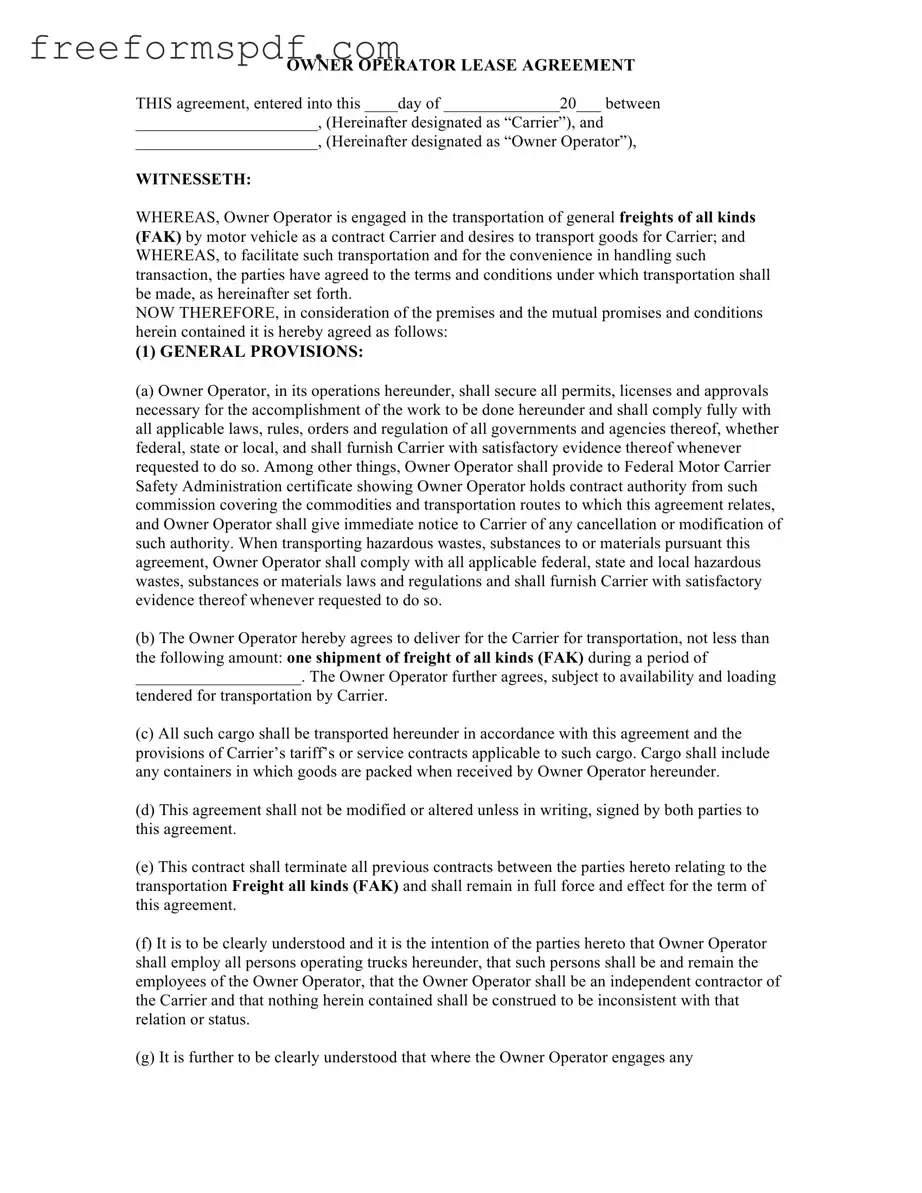Fill in a Valid Owner Operator Lease Agreement Template
Common mistakes
-
Incomplete Dates: Failing to fill in the date of the agreement can lead to confusion about the contract's validity period. Ensure that the date is clearly written in the designated space.
-
Missing Signatures: Both the Owner Operator and Carrier must sign the agreement. Without signatures, the document is not legally binding. Double-check for both signatures before submission.
-
Incorrect Information: Providing inaccurate details about the parties involved, such as names or addresses, can create legal issues. Verify all information for accuracy before finalizing the form.
-
Omitting Required Permits: The Owner Operator must secure all necessary permits and licenses. Not providing proof of these can lead to non-compliance issues. Be sure to include documentation of required permits.
-
Ignoring Confidentiality Clauses: Failing to acknowledge and understand the confidentiality requirements can result in unauthorized disclosures. Review these sections carefully and ensure compliance.
Learn More on This Form
-
What is an Owner Operator Lease Agreement?
An Owner Operator Lease Agreement is a contract between a carrier and an owner operator. This agreement outlines the terms and conditions under which the owner operator will transport goods for the carrier. It establishes the responsibilities of both parties, including compliance with laws, insurance requirements, and liability for cargo.
-
Who is responsible for obtaining permits and licenses?
The owner operator is responsible for securing all necessary permits, licenses, and approvals required for transportation operations. This includes complying with federal, state, and local regulations. The owner operator must also provide satisfactory evidence of these permits to the carrier when requested.
-
What happens if the owner operator needs to modify the agreement?
Any modifications to the Owner Operator Lease Agreement must be made in writing and signed by both parties. This ensures that any changes are formally acknowledged and legally binding.
-
How is liability handled for cargo damage or loss?
The owner operator assumes liability for the safe transportation of all goods entrusted to them. They are responsible for any loss or damage that occurs while the goods are in their care. This includes ensuring that any subcontractors they engage also adhere to these liability standards.
-
What insurance coverage is required?
The owner operator must maintain various types of insurance, including cargo, personal injury, and general liability insurance. This coverage must meet the minimum requirements set by the Federal Motor Carrier Safety Administration and the Uniform Intermodal Interchange Agreement (UIIA).
-
Can the owner operator assign the agreement to someone else?
No, the owner operator cannot assign the Owner Operator Lease Agreement to another party without obtaining written consent from the carrier. This provision ensures that both parties remain accountable under the terms of the original agreement.
-
What is the payment process for the owner operator?
The carrier agrees to pay the owner operator according to the rates and charges outlined in the rate schedule attached to the agreement. Payments are to be made within sixty days of the invoice date, ensuring timely compensation for services rendered.
-
How is confidentiality maintained in this agreement?
The owner operator is required to treat the terms of the agreement and any confidential information about the carrier's business as private. They cannot disclose this information to third parties without obtaining prior written consent from the carrier.
Misconceptions
Misconceptions about the Owner Operator Lease Agreement can lead to confusion and potential issues for both parties involved. Here are ten common misconceptions:
- Owner Operators are employees of the Carrier. Many believe that signing this agreement makes them employees. In reality, Owner Operators are considered independent contractors.
- The Carrier is responsible for all liabilities. Some think the Carrier handles all liabilities. However, the Owner Operator assumes significant liability for the goods they transport.
- This agreement allows for verbal modifications. People often assume they can change terms verbally. Any modifications must be in writing and signed by both parties.
- Owner Operators do not need permits or licenses. There is a misconception that permits are unnecessary. Owner Operators must secure all necessary permits and comply with regulations.
- Insurance coverage is optional. Some believe they can skip insurance. The agreement requires Owner Operators to maintain specific insurance coverage.
- All cargo can be transported without special considerations. Many think all goods are treated equally. Certain cargo, like hazardous materials, requires strict compliance with regulations.
- Owner Operators can assign their contract to anyone. There is a belief that contracts can be easily transferred. In fact, assignments require written consent from the Carrier.
- Confidentiality only applies to financial information. Some think confidentiality only covers money matters. However, all business-related information must remain confidential.
- Notices can be sent via any method. Many assume they can use informal communication. Notices must be sent in writing by certified or registered mail.
- The agreement is only binding when signed. Some believe it becomes effective at any time. The agreement is binding only upon the signature of both parties.
Browse More Forms
I983 - Updating the I-983 is essential if there are changes to the employment conditions or training plan.
For anyone considering a transaction, having a reliable document is key. A helpful resource is the user-friendly Motorcycle Bill of Sale form, which ensures that all necessary details are documented, providing both parties with a sense of security and clarity.
Citibank Atm Deposit - This form allows you to set up direct deposit with Citibank.
